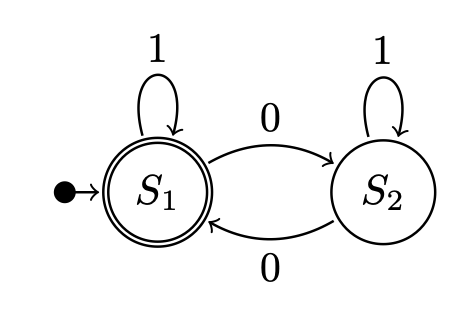|
Finite Automata
A finite-state machine (FSM) or finite-state automaton (FSA, plural: ''automata''), finite automaton, or simply a state machine, is a mathematical model of computation. It is an abstract machine that can be in exactly one of a finite number of '' states'' at any given time. The FSM can change from one state to another in response to some inputs; the change from one state to another is called a ''transition''. An FSM is defined by a list of its states, its initial state, and the inputs that trigger each transition. Finite-state machines are of two types— deterministic finite-state machines and non-deterministic finite-state machines. For any non-deterministic finite-state machine, an equivalent deterministic one can be constructed. The behavior of state machines can be observed in many devices in modern society that perform a predetermined sequence of actions depending on a sequence of events with which they are presented. Simple examples are: vending machines, which dis ... [...More Info...] [...Related Items...] OR: [Wikipedia] [Google] [Baidu] |
Model Of Computation
In computer science, and more specifically in computability theory and computational complexity theory, a model of computation is a model which describes how an output of a mathematical function is computed given an input. A model describes how units of computations, memories, and communications are organized. The computational complexity of an algorithm can be measured given a model of computation. Using a model allows studying the performance of algorithms independently of the variations that are specific to particular implementations and specific technology. Categories Models of computation can be classified into three categories: sequential models, functional models, and concurrent models. Sequential models Sequential models include: * Finite-state machines * Post machines ( Post–Turing machines and tag machines). * Pushdown automata * Register machines ** Random-access machines * Turing machines * Decision tree model * External memory model Functional models Functio ... [...More Info...] [...Related Items...] OR: [Wikipedia] [Google] [Baidu] |
State-transition Table
In automata theory and sequential logic, a state-transition table is a table showing what state (or states in the case of a nondeterministic finite automaton) a finite-state machine will move to, based on the current state and other inputs. It is essentially a truth table in which the inputs include the current state along with other inputs, and the outputs include the next state along with other outputs. A state-transition table is one of many ways to specify a finite-state machine. Other ways include a state diagram. Common forms One-dimension State-transition tables are sometimes one-dimensional tables, also called ''characteristic tables''. They are much more like truth tables than their two-dimensional form. The single dimension indicates inputs, current states, next states and (optionally) outputs associated with the state transitions. : Two-dimensions State-transition tables are typically two-dimensional tables. There are two common ways for arranging them. In th ... [...More Info...] [...Related Items...] OR: [Wikipedia] [Google] [Baidu] |
